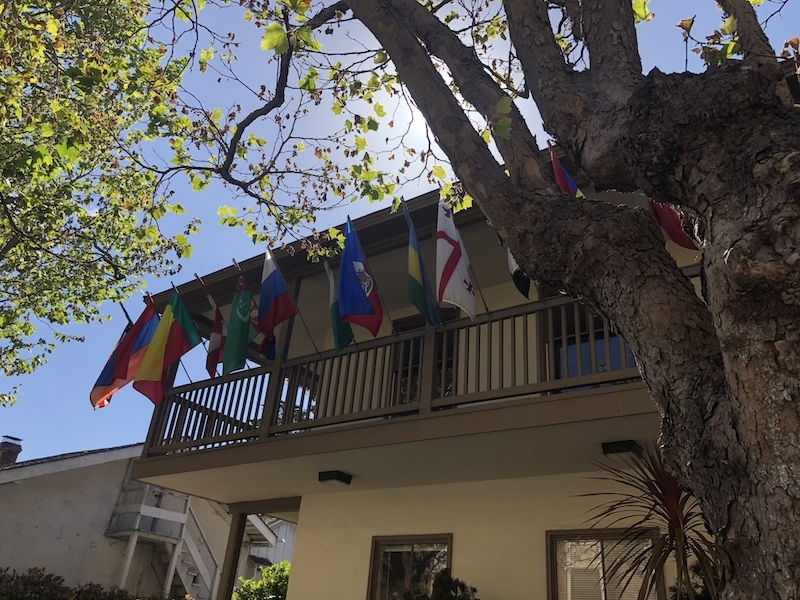Learning in Crisis: A Global Pandemic in the Classroom

The Covid-19 pandemic has not only disrupted traditional in-person methods of delivering classes at educational institutions around the country and across the globe, but in the case of many Middlebury Institute courses, brought a global case study directly into the classroom.
In many ways, a global crisis of this kind accentuates the urgency of a MIIS degree. Students come to the Institute to develop skills and acquire knowledge to tackle some of the most pressing issues of our time, and to start making an impact in their chosen field immediately. As Jeff Dayton-Johnson, dean of the Institute shared with students in a recent email: ”Your MIIS education will prepare you to take on challenges and uncover the opportunities of a world in flux. Your language skills, foundational policy knowledge, adaptability, perseverance, and outlook are needed now more than ever.”
There are many examples of faculty finding creative ways to create and maintain community during this period of remote learning. Professor Rana Issa has been inviting her Arabic classes to weekend optional cooking lessons where she shares recipes from her native Lebanon. Food features in some other extracurricular activities such as the virtual potluck hosted by Professor Netta Avineri’s service learning course, and the international cuisine week and international poetry week, both organized by a group of faculty and staff and featuring a variety of events.
In many ways, a global crisis of this kind accentuates the urgency of a MIIS degree. Students come to the Institute to develop skills and acquire knowledge to tackle some of the most pressing issues of our time, and to start making an impact in their chosen field immediately.
Other faculty have had to made considerable changes to their plans when proactive measures to help stop the spread of the disease led all classes to be taught online. Professor Gabriel Guillen has been teaching a tandem language learning class, pairing Institute Spanish learners with members from the community who are learning English. When the MIIS students could no longer travel to Salinas for interactions with their tandem learning partners they devised other methods for communications. “It is important to be flexible in these situations,” Guillen shares. “Some students have been using WhatsApp, others Zoom or FaceTime – it all depends on what works best for their partners and them. Those who do not have smartphones use regular phone calls to keep in touch. Often the conversations and memes shared are about the virus and what is going on.”
Professor Pushpa Iyer teaches a sprintensive course on Storytelling for Change. The three-week, 18-hour per week course was scheduled to begin the day after spring break, which this year turned out to be the day all courses moved to remote instruction. Read her story of reimagining the course in a matter of days and how it all worked out here.
For Professor Pam Berenbaum, there was no question a global pandemic would feature heavily in her Public Health in Disasters class. But even though she had previously planned lessons on the 1918 Flu Pandemic and Katrina, those sessions took on a renewed focus and urgency. Suddenly, events and lesson learned a century ago seemed particularly relevant, and the underlying issues that led to some of the greatest tragedies of Katrina led to discussions about which parts of society are hardest hit today.
In Marie Butcher’s English classes students wrote about how the Shelter-in-Place order is impacting them and then expanded on what possible positive outcomes they could see from this crisis. In her Business Correspondence class students researched and wrote about how the pandemic is changing their chosen professional fields.
MIIS faculty members Wei Liang and Yuwei Shi and Middlebury College Associate Professor of Political Science Jessica Teets had planned a spring semester course studying China’s development challenges that was supposed to end with a trip to rural and urban China this June. When those plans changed, they incorporated an exploration of China’s response to the pandemic.
Two of the Institute’s Research Centers, the James Martin Center for Nonproliferation Studies (CNS) and the Center on Terrorism, Extremism, and Counterterrorism (CTEC) have added various aspects of the pandemic to their research projects. CTEC researchers have published several reports on their investigations into Covid disinformation. One of the reports was featured cited recently by the Washington Post. CNS researchers who have been studying ways that 3D printing might be aiding proliferation of weapons of mass destruction are now looking into how these technologies are being used to produce much-needed medical supplies today. For a comprehensive guide to Covid 19 related research by CNS experts and non-resident scholars, including a Q and A section, visit a site they have created devoted to pandemic research.
These are just a few examples of how the Middlebury Institute faculty are finding creative ways to offer lessons in a changed educational environment, to continue to find meaningful ways to connect on a personal level, innovative ways to incorporate a global crisis into coursework, and conduct important research during this global crisis. This is MIIS being MIIS.
For More Information
Eva Gudbergsdottir
eva@middlebury.edu
831.647.6606
